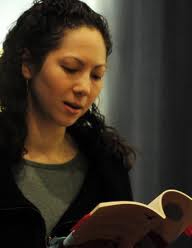
Kim-An Lieberman has left us too early. On the few occasions I met Kim-An in person or heard her read, I wished to know her better–warm, funny, and so so smart, kind, down to earth, generous. I knew her through her poems, especially her gorgeous first book, Breaking the Map (Blue Begonia Press, 2008).
I think most of us come to writing, at least initially, to sort out our own identities, and I felt that was so with Kim-An’s first book. Here were the two sides of herself–her Vietnamese heritage, her Jewish heritage, and the split between. She found rich material, for example, in her grandmother’s sudden and epic relocation to California from Saigon in 1975. She writes about this in the introduction to her wonderful poem, “Water Buffalo Tale” on the Poetry Northwest site. The surreal sometimes appeared in Kim-An’s poetry, surprising but perfectly at home, and seemed to grow up out of that split in her identity like a flower in a sidewalk crack.
I’m eagerly anticipating Kim-An’s forthcoming collection, In Orbit, which will appear from Blue Begonia Press early in 2014. Jack Straw Studios will be hosting a reading from In Orbit sometime this spring. Please keep an eye out for a date and help us celebrate her abiding talent and voice. Find a beautiful tribute to her in The Seattle Times here, and another by poet Alan Chong Lau in the International Examiner here, and a third by local literary critic Paul Constant here.
A memorial will be held on December 30th at 3:00 p.m. in the Seattle Asian Art Museum. In lieu of flowers the family requests donations be made to the Kim-An Lieberman Memorial fund at The Evergreen School to offer financial aid for students in need.
Here is Kim-An’s beautiful and unexpected poem, “Wings,” from Breaking the Map.
Wings
It had been three years, maybe longer, and the map of his body
……….was etched
in her palms. The stretch of his legs. The stiff, clean-shaven line of
……….his jaw.
His left ring finger, curved slightly inward. So of course she made
……….the discovery.
The first feathers appeared in a pair. She was facing him in the grey
……….wash of morning,
stroking the knoll of his shoulder blade, when twin quills broke
……….suddenly through the skin.
He locked himself in the bathroom for hours, cursing blankly
……….at the mirror.
They grew quickly, eclipsing his back like snowfall. In the moonlight they
……….were lustrous.
she would brush them gently with a damp washcloth, gather loose
……….feathers in a basket.
Under their spreading canopy his muscles formed tight knots, pulsing
……….like fists.
He complained about their aching weight, how they poked holes in his
……….favorite sweater
and sometimes, of their own accord, began to flap and pull his feet
……….from the ground.
Just think of all the usefulness, she said, fan on a flaming night or extra
……….warmth in winter.
But he became sullen, took long walks alone after dinner, absolutely
……….refused to see a doctor.
He would not go to the beach anymore, even when she promised
……….a three-color sunset.
Can’t trust these things, he told her, and I’m not stupid. I know
……….my mythology.
When he asked her to leave, it was another grey morning. He lay
……….sprawled on his stomach
at the opposite end of the bed. He gave no reason, but she knew it was
……….another woman
because their beauty was blinding. Even fully clothed he leaked
……….gallons of light.
In time she moved on, ripped up his pictures and set the ridiculous
……….basket of feathers on fire.
But some mornings she woke drenched in jealousy. Half-believing
……….she heard a rustle,
she would stare at her husband’s empty back and wonder if anything
……….would change.

